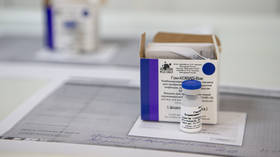Western scientists divided over Russian Covid-19 vaccine Sputnik V as developers aim to make ONE BILLION doses in 2021

Experts and world leaders continue to have conflicting opinions on Russia’s pioneering Sputnik V coronavirus vaccine, as the country moves closer to delivering a mass immunization program at home and exporting it abroad.
Speaking to Canadian broadcaster CBC, Ian Jones, a professor of virology at the University of Reading in the UK, said the outlook for the jab was positive. “I see no reason to doubt it,” he said in remarks published on Saturday. “The initial results caused consternation, but I don’t think it’s because they weren’t valid. They were released a bit soon… I think it’s going to be a useful vaccine.”
However, Italian scientist Enrico Bucci, an adjunct professor specializing in research integrity at Temple University (Philadelphia), disagreed, arguing that “the sample is too low to claim any percentage of efficacy.”
Also on rt.com Hot on the heels of Sputnik V, Russia’s 2nd Covid-19 vaccine ‘EpiVacCorona’ set for release in December, say developersSome international experts expressed concern at the speed with which Russia became the first country in the world to approve a preventive formula against Covid-19 in August. Peter Openshaw, professor of experimental medicine at the National Heart & Lung Institute, Imperial College London, said at the time he was concerned “that the experimental vaccine is being given to the Russian elite before it has undergone full testing in a formal clinical trial.”
Russian authorities have written off these claims as “Western bias,” and the Gamaleya Center, which developed the formula, argued that the decision was made on the basis of promising early clinical trial data, which was published in the Lancet medical journal. Vladimir Putin’s spokesman, Dmitry Peskov, has also denied that the Russian president has had the jab, saying that he would be unable to access it early “just because he is head of state.” Prime Minister Mishustin and Peskov himself both previously tested positive for the virus.
Earlier this month, the creators of Sputnik V announced that it appeared to be more effective than was previously thought. According to their analysis of larger samples of people participating in trials, around 95 percent of those who receive it develop immunity to Covid-19. They argue that their use of a pre-existing adenovirus platform enabled them to deliver a vaccine candidate more rapidly than the British and US alternatives.
More than 500 million people are expected to be able to access the jab in 2021, according to the developers. Each person will require two injections, spaced out over a period of weeks, and efforts are underway to manufacture the one billion doses required.
Also on rt.com Russia strikes deal with India to produce 100 million doses of Sputnik V Covid-19 vaccine per yearNegotiations are have also begun with companies across the world to increase manufacturing capacity. Earlier this week it was announced that the vaccine would also be produced in India as part of a bilateral agreement. Individual countries have also faced decisions over which vaccine candidates they choose to order. Earlier this month, Argentina announced that it would procure millions of vials of Sputnik V as part of its efforts to prevent the spread of the virus. Hungary has also begun importing experimental quantities of the vaccine, and the European Medicines Agency (EMA), which licenses all vaccines within the EU, is considering a request to approve the formula.
Think your friends would be interested? Share this story!














